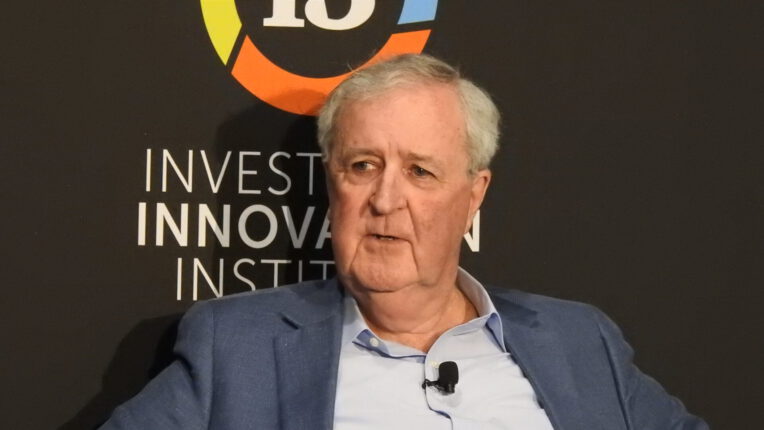Former RBA Governor Ian Macfarlane warns rates will remain high for longer than the market seems to be pricing it in at the moment.
Former Reserve Bank of Australia (RBA) Governor Ian Macfarlane has warned that inflation is unlikely to fall as quickly as it has risen and this means interest rates will remain high for some time to come.
Macfarlane, who spoke at the [i3] Asset Allocation Forum in Terrigal last month, indicated inflation could go as high as eight per cent before it starts to fall again.
“I think it is unlikely that inflation will get back to two point something in the next two years, although this is what the RBA and Treasury are forecasting,” he said during a fireside chat at the forum.
“It is more likely that inflation will peak at eight per cent, then settle at three or four per cent.
“For monetary policy to have any hope of putting downward pressure on inflation, we would need a positive real interest rate, so we are talking about a cash rate of four or five per cent, which is higher than current official or market expectations.”
Market expectations seem to factor in only a modest rise in inflation and as a result a more muted monetary response that will put cash rates at a little over three per cent, after which rates would be reduced again.
But Macfarlane was sceptical about these forecasts.

To me, it would be a remarkable achievement if this inflationary surge could be brought to an end by such a modest and short-lived rise in interest rates
“To me, it would be a remarkable achievement if this inflationary surge could be brought to an end by such a modest and short-lived rise in interest rates,” he said.
He acknowledged some of the current inflation is transitory, caused by disruptions to supply chains during the coronavirus pandemic, while the invasion of Ukraine has put pressure on energy prices.
But as supply chain problems have started to be resolved, some of the inflationary forces will fall away during 2023.
“At some point during 2023, we will see declines in the rate of inflation as the transitory elements fall away. And by then cash rates will have been raised to 3 per cent plus,” Macfarlane said.
“There is a risk that people will attribute the fall in inflation to the tightening of monetary policy and conclude that the job has been done. That seems to be what the market is currently thinking, hence the expectation of falling interest rates in the second half of 2023.
“But it all depends on how far inflation falls. For this scenario to occur, inflation would have to be nearly back to the two to three per cent range by the second half of 2023.
“If, like me, you doubt this and think inflation is more likely to be considerably higher, then it would be irresponsible for central banks to start cutting rates.”
The RBA has forecast Consumer Price Index inflation will still be 6.25 per cent in the year to June 2023, while underlying inflation will be around 5 per cent. If this scenario plays out, then it is unlikely the central bank would stop raising rates at about three per cent or that it would reduce rates by the second half of 2023, Macfarlane argued.
“If inflation settles at four per cent and the cash rate were to stay at three per cent or so, then it would still be negative in real terms and so unlikely to make any progress in reducing inflation,” he said.
“So, I think cash rates in the range of four to five per cent may be required and I cannot see them falling in 2023 or 2024. This would mean a much weaker economy than the market is currently pricing in.”
Recession
As central banks worldwide try to contain inflation and continue to raise cash rates, the chances of a widespread recession increase.
Macfarlane pointed out Jerome Powell, Chair of the Board of Governors of the Federal Reserve System in the United States, has already said he is less worried about a recession than a failure to restore price stability.
Looking back at US history, Powell has a point. Recessions tend to be common events in the country, occurring in 1974, 1982, 1991, 2001, 2008 and 2020.
But since the Second World War, there has been only one entrenched peace-time inflation: the 1970s. And the resolution of that inflationary period was a long and painful experience, Macfarlane said.

An error that led to a recession would be regarded as a smaller error than one which led to a second entrenched peace-time inflation
“An error that led to a recession would be regarded as a smaller error than one which led to a second entrenched peace-time inflation,” he said.
“And would the recession be an error? Not if that was a necessary part of solving the inflation problem.
“There is a chance that, given an early monetary policy response, inflation can be brought back to target without a recession, but I would rate it as a less than 50 per cent probability.”
__________
[i3] Insights is the official educational bulletin of the Investment Innovation Institute [i3]. It covers major trends and innovations in institutional investing, providing independent and thought-provoking content about pension funds, insurance companies and sovereign wealth funds across the globe.

